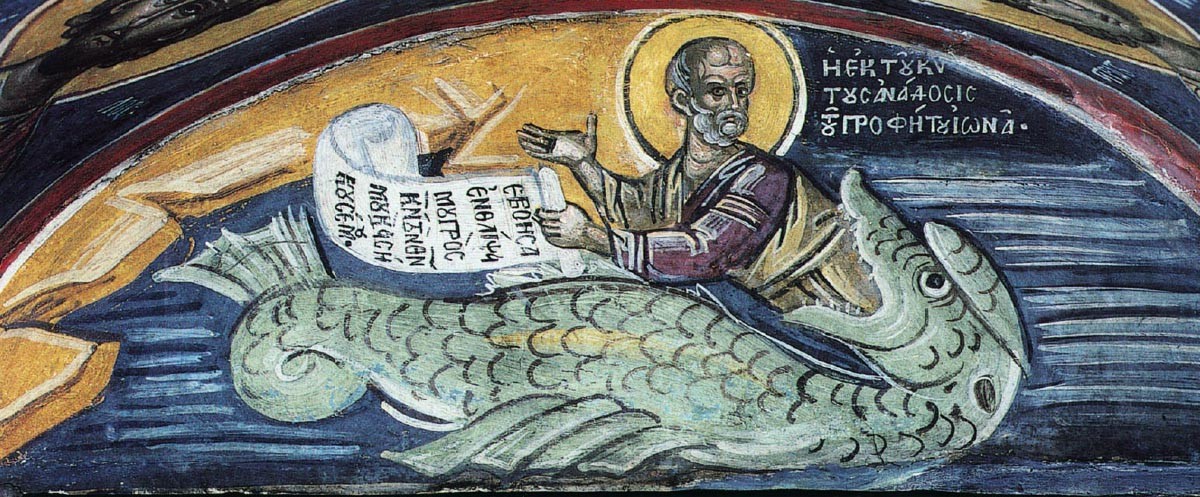My title might seem odd. Do we really need Jonah?
As a prophet, Jonah was a spectacularly reluctant one, who very reluctantly followed God’s call to preach to the Nineties. Even when he did begin his work in Ninevah, he was rather upset that the Ninevites actually took God’s Word to heart and turned their lives around. As today’s first reading shows us, God forgave the Ninevites just as God promises to give mercy, grace, and forgiveness to all of us.
If you read on in Chapter 4, you’ll see the conclusion of this story. Jonah is angry that God forgives, stalks out of the city, and sulks by himself. He appears to hope that Ninevah will find itself once more sinning, once more at at the edge of God’s wrath. Despite Jonah’s petulance, God keeps trying to break into his heart – in part by growing up a gourd plant that becomes a tangible example for Jonah to consider, and which Jonah cares for (unlike the Ninevites). Yet God also causes the gourd plant to wither away. The book concludes with God’s admonition:
But God said to Jonah, “Do you have a right to be angry over the gourd plant?” Jonah answered, “I have a right to be angry—angry enough to die.” Then the LORD said, “You are concerned over the gourd plant which cost you no effort and which you did not grow; it came up in one night and in one night it perished. And should I not be concerned over the great city of Nineveh, in which there are more than a hundred and twenty thousand persons who cannot know their right hand from their left, not to mention all the animals?”
Jonah 4:9-11
Do we really need Jonah?
The thing is, in this moment in American Catholic life, I think we – and by we, I mean the we I see displayed on social media in all forms and the we writing op-eds and even the tragic we who walk on the other side of the road when they see someone from the other political party (yes, this has happened to me) – we already are Jonahs.
We are reluctant to do what God calls us to do: to be people of peace, actually in fact seeking peace with people across the political aisle, or who wear/don’t wear the mask, or who fervently see differently about abortion, immigration, race, climate change, and all the host of issues that divide us.
Indeed, in this moment when we are divided not just in our articulations of which issues we “believe in” – but in our very conceptions of what is true, what is real – we have great difficulty reaching into another person’s parallel universe.
This is not a Democratic or Republican thing. It’s a We thing. We are Jonahs.
But I have not seen much evidence (unfortunately myself included), even with great reluctance, of our reaching out to our personal Ninevites with compassion, forgiveness, and mercy – or hey, how about just simply bothering to walk with someone on the same road.
In today’s Epistle reading, St. Paul is clear. In today’s Gospel reading, Jesus is clear. We are asked – despite all pictures to the contrary – to live and be in the New Creation, the Kingdom of God, even though all the vestiges of the old also remain.
I have worried about our collective reluctance to reach out especially when it comes to being fully pro-life, and fully committed to Catholic social teaching about just wages, care of the environment, and more. I worry that I’m seeing more people simply dismiss others for not promoting life of the unborn, on the argument that the unborn are most vulnerable and most in need of our care. Well, the unborn are most vulnerable – but if we preclude all conversations and actions about immigrants – another most vulnerable population – until abortion laws look a certain way, we shall only tighten up our bubbles/silos/ivory towers/etc. I think the same is true for promoting a truly Catholic vision of immigration, the Common Good, anti-racism, and more.
To live the Gospel is difficult. Earlier in his letter to the Corinthians, St. Paul describes the difference between living the old life and the new:
1 Corinthians 4:10-14
We are fools on Christ’s account, but you are wise in Christ; we are weak, but you are strong; you are held in honor, but we in disrepute.To this very hour we go hungry and thirsty, we are poorly clad and roughly treated, we wander about homeless and we toil, working with our own hands. When ridiculed, we bless; when persecuted, we endure; when slandered, we respond gently. We have become like the world’s rubbish, the scum of all, to this very moment. I am writing you this not to shame you, but to admonish you as my beloved children.*
The Eucharist is perhaps the Catholic version of the gourd plant. It reminds us: God cares for us in great mercy – and God cares for all of the other We. We are the Body of Christ – we need to show that now more than ever – by blessing each other and by seeking to live now in mercy and compassion – even if mercy and compassion seem not to be the order of the day.
The Rev. Dr. Silvester Beaman prayed, in his inauguration benediction, for us “to make friends of our enemies.” That is hard to do – but yes, it is definitely a call that God places on Christians. Perhaps that is work we can do, even as reluctant Jonahs.



